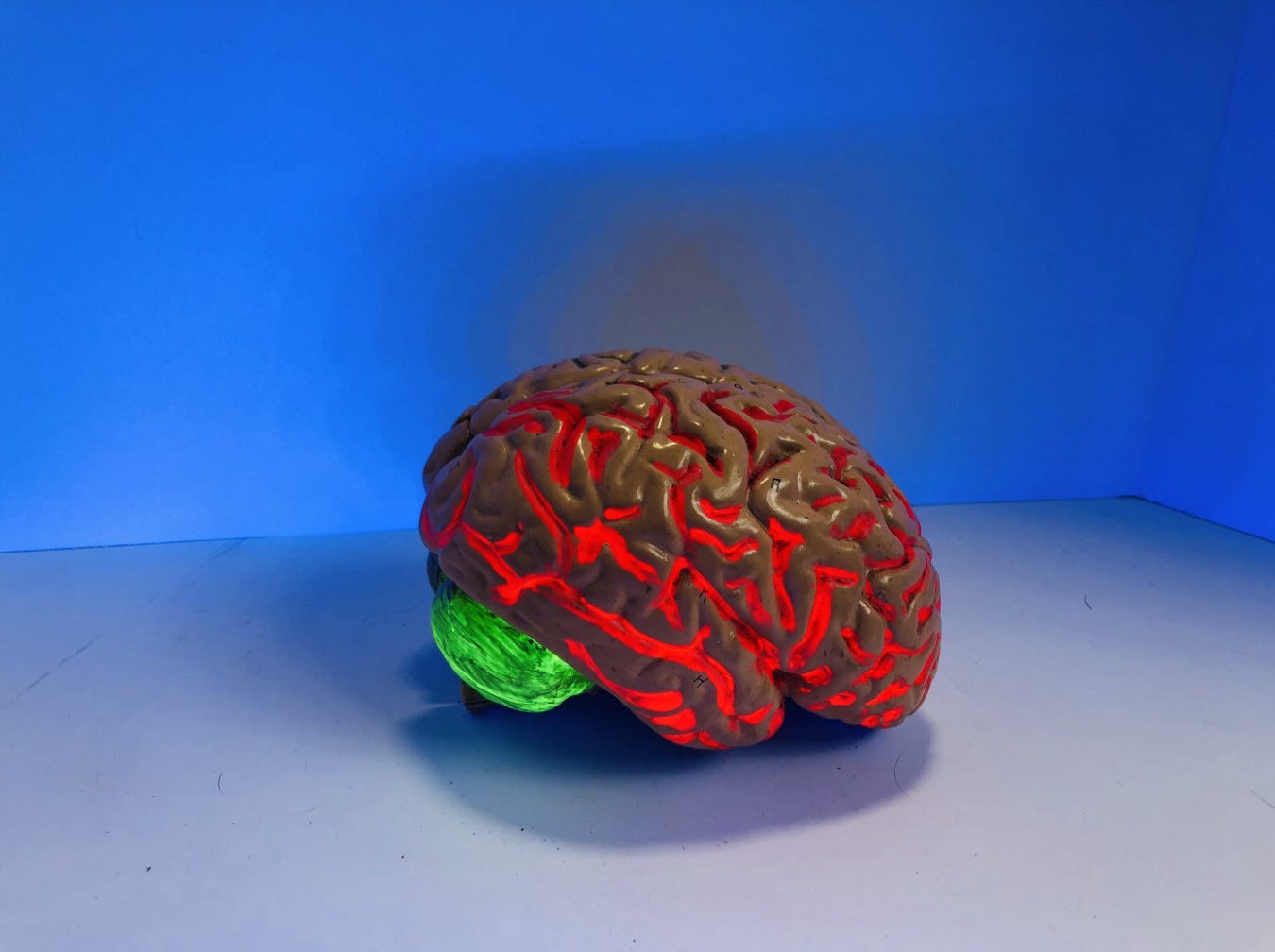Hey,
I hope you’re doing okay. I heard a great saying in church today:
A grain has to die in the soil for it to grow. When it’s in the soil, it looks as though no progress is happening. There’s progress, it’s just not manifesting yet.
Focus on the process. Your grain will continue to flourish.
Stay Jiggy.
Want to receive notifications via WhatsApp when I send these letters out? Share your phone number here
Got a musing you think I should explore in my letters? Share it with me here and I might just write about it.
Picture yourself standing at the foot of a staircase. You're about to go upstairs. Ten seconds later, you've climbed the stairs and are on the next floor.
For each step that you took as you climbed the stairs, did you think about how to move your leg? Did you think about the specific height you needed to raise your foot to climb each stair properly? Likely not.
Let's say you get on a boat for the first time. You've never been on a boat before but you wouldn't want everyone to know that. You dig into your memory bank to picture how to act on a boat. If you've seen how people behave on boats in movies or somewhere else in the past, you'll likely be fine. You'll know what to do, to an extent.
Let's do another one. Let's take sport or learning a new skill. I'll use Table Tennis as an example. When you first start playing tennis, you'll have to learn how to hold the bat. You'll learn how to hit the ball to ensure it gets into your opponent's side of the table and not yours. Over time, you'll learn how to make curves with the ball and more advanced moves.
If you play the game every week for three months. At the end of that three month period, when you play tennis, you'll move the bat the right way without thinking about it. You'll hit the ball with the right power and curve almost with intuition and without 'thinking' about it.
Image credit
These are all examples of our subconscious mind at work.
I've always been intrigued by the concept of the subconscious. Growing up, I read a lot of 'motivational' books (and I still consume lots of inspiration material) and positive thinking is pretty big in that world. They talk a lot about the power of the subconscious mind and how you can leverage its power for growth, happiness and success.
However, there's rarely talk about what exactly the subconscious is. Why it exists. How it works. Why our knowledge of it is important for us.
I aim to explore these in this letter.
What is the subconscious mind?
The subconscious is the part of our mind that stores and retrieves data. When we are conscious, we are 'aware'. We can understand and process things that are going on in our environment. The subconscious is our 'unaware' state.
It is always on. It is always working.
Our subconscious stores everything. We get exposed to so much information each day and we forget up to 99% of what happens on a daily basis. But that information isn't lost. It goes to our databank that is the subconscious. It's like a computer program that our conscious state can call on when needed.
It is common for us to think that we are in constant control of our thoughts and our actions but we are not. It has been scientifically proven that 90-95% of our behaviour is directed by our subconscious while our conscious takes care only of 5-10%.
Most of what we do goes on unconsciously. It is the exception, not the rule when thinking is conscious, but by its very nature [i.e., because we cannot experience anything else], conscious thought seems the only sort. It is not the only sort; it is the minority. - Roy Lachman, Janet Lachman, and Earl Butterfield.
Our subconscious is like an operating system. A computer hard drive with information stored from before we were born. It captures information and helps guide our behaviour, beliefs and actions based on our learned experiences.
We learned how to walk a long time ago, so we don't need to dedicate conscious processing power to it.
Our Conscious Provides Guidance
If the subconscious is so rich in data. How much of this data do we leverage?
In some situations where we're trying so hard to solve a challenge or find answers to something that's going on in our life, we're likely putting too much processing on the conscious mind. If we relaxed, we would likely be able to tap into our deep subconscious which has massive data points that we can draw from.
In some other situations, our subconscious can be restrictive. Since it informs a huge amount of our behaviour, we might be executing programs that are not the best ones. Take the concept of gender equality as an example. For folks like me who grew up in an African home & culture, the male gender is positioned to be superior to the female gender.
Over my lifetime, this is the information that my subconscious has been exposed to. So naturally, if I find myself in a situation where I need to make a decision/take an action related to this, that is the program that my brain runs.
I have gotten to a point where I've found new information about this programming. It differs from what I was taught and the argument that this is a better program to imbibe makes sense to me. So gradually, I start telling myself that I need to upgrade this programming and replace the old one.
I've always pondered the question: Who am I?
Beyond the attributes that we label ourselves with. What is that inner compass that guides and forms what we think of ourselves? I've done some research and I'm still yet to have a comprehensive answer to that question.
Understanding the subconscious provides some understanding though. It provides the understanding that we are all a set of programs. We have different programs that have been coded for different parts of our lives. "This is the way I am" sometimes is a culmination of how we have programmed ourselves to see the world or react in certain instances.
Can it be changed entirely? I don't think so. Can some elements change though? I absolutely think so.
I also think that this is a good way to help people understand why they should keep an open mind to life. The belief you are so insistent on. The way of life that you think is the only way. The skills that you've told yourself you're not great at. It is not the total truth.
For many of them, they are meant to be updated. They are programs that were written sometimes without your approval. They were written before you could make the decision about what you want. And when you got to the point where you could make that decision, your opinion was probably guided by those old beliefs and your environment.
But it doesn't mean that's the only programming that exists. When you expose yourself to new information/ways of doing things, you might unlock some capacity you were previously unaware of. At least give yourself a chance to make that decision by yourself. If you go down that path and still decide it's not worthy, you can then reinforce your subconscious programming.
One of the best examples of the role of the subconscious in my life is in my typing ability.
About 6 years ago, I decided that I wanted to learn how to type without looking at the keyboard. I looked for software to learn it and I would spend my bedtime hours almost every day practising this skill.
At the beginning, my speed of typing dropped from 40 wpm (words per minute) to about 20wpm. I also had to be conscious each time I was typing in those early days to ensure that I was placing my fingers on the right key on the keyboard.
Nowadays, my typing speed is about 70-80 wpm and I dedicate almost ZERO processing power to thinking about the keys when I'm typing. Somehow, my fingers know where the right keys are and it does it automatically. All I have to do is think about what I actually want to type. I can type at the speed of my thought because I've freed up conscious processing power that I used to share with typing on the keyboard.
I wonder how many more areas of my life I'm dedicating conscious energy to that I can leverage the subconscious a lot more.
How we can train our subconscious
Based on my research, there are two ways we can train our subconscious to create new behaviours, modify old beliefs, learn new skills and more.
Repetition: You likely know about the popular 10,000-hour rule. It states that when you go past the 10,000-hour mark in a skill/area of focus, you attain mastery. This makes sense seeing that the subconscious has been provided with so much data. With little effort, the conscious mind can work miracles on such data.
Many simple changes we need to make though don't require that many hours. We just have to repeat them long enough. So if you want to take up a new habit, repeat it for as long as possible. The same goes for new skills, modifying some beliefs, changing our attitudes and more. We can rewrite our truth.
Hypnosis: To be fair, I don't understand this fully yet and my conscious mind wasn't able to process it, lol. That said, think of it like deep meditation.
In a hypnotic state, you are able to access your deepest thoughts which is usually only possible when you're asleep (i.e, unconscious). In this state, you are aware and able to access that data.
Many people say that hypnosis can help us to resolve trauma. Especially trauma from our childhood. It’s something I'll dig into more later. From my little experience of meditating once in a while though, the clarity that comes from accessing your deepest thoughts is enriching. I am calmer, more assured, less worried and generally more fulfilled when I meditate. We all should do more meditation.
Image credit
Our conscious mind is like an API. It is an interface through which we can get access to unlimited data. Every single thing we experience is stored. This means that we're likely not leveraging all of the information we have access to because we don't even know that we have access to it.
Try to get closer to your subconscious. Explore it. Try to dig into your data bank to understand some of the beliefs you have and why you have them. Explore it to resolve some issues you're facing but you usually wouldn't have time to settle down to tackle. Explore it to understand what happiness is to you. Explore it to understand you better.
It probably has more relevant data than any pastor, friend, acquaintance, or the internet can give you.
Stay subconscious.
What did you think of this week's letter?
I love it! ◌ I Like It ◌ Not Bad ◌ I Don’t Like It ◌It’s Awful
Musing in Your Head
What do you think about the subconscious and how much of it do you think you leverage?
Let me know in the comments section.
This letter was written while listening to a Jon Bellion mix.
The deeper mind is something that has the ability to know more than we do. Because it has more data. When we work from the heart, we are tapping into our deeper mind.
Love always,
Francis.
![Musings in My Head [MIMH]](https://substackcdn.com/image/fetch/$s_!CSau!,w_80,h_80,c_fill,f_auto,q_auto:good,fl_progressive:steep,g_auto/https%3A%2F%2Fbucketeer-e05bbc84-baa3-437e-9518-adb32be77984.s3.amazonaws.com%2Fpublic%2Fimages%2F70030068-5442-485e-9273-b1c22725e34f_200x200.png)

![Musings in My Head [MIMH]](https://substackcdn.com/image/fetch/$s_!CSau!,w_36,h_36,c_fill,f_auto,q_auto:good,fl_progressive:steep,g_auto/https%3A%2F%2Fbucketeer-e05bbc84-baa3-437e-9518-adb32be77984.s3.amazonaws.com%2Fpublic%2Fimages%2F70030068-5442-485e-9273-b1c22725e34f_200x200.png)
![Musings in My Head [MIMH]](https://substackcdn.com/image/fetch/$s_!tMBS!,w_152,h_152,c_fill,f_auto,q_auto:good,fl_progressive:steep,g_auto/https%3A%2F%2Fbucketeer-e05bbc84-baa3-437e-9518-adb32be77984.s3.amazonaws.com%2Fpublic%2Fimages%2Fc0b8b3c0-5198-4ed9-83ea-03f17f357e31_2135x2135.png)















Share this post